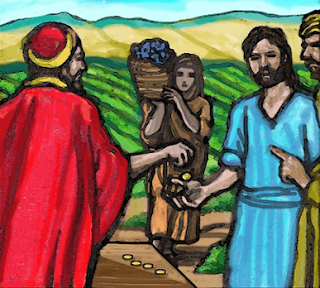Matthew 18: 21-35
Dear Friends, Today’s Gospel continues Jesus’ teaching on the Church as a Christian community. Peter asks the question that set the scene. In the question of how many times we must forgive, Peter reveals a tremendous amount of growth.
Remember all his life Peter was a faithful Jew who listened to the teaching of the Law. The message was clear: an eye for and eye, a tooth for a tooth. While this teaching actually put very severe limits on revenge, Jesus’ teaching of turning the other cheek was a world shattering challenge for His contemporaries and for us. Apparently, Peter had bought in when he asked if seven times met Jesus’ standard for forgiveness. When you think about it, how many people forgive someone outside their family seven times: very few!
Here again Jesus uses a parable to invite Peter and us into the radical world of the Gospel. The story is clear and inviting. The first person owes an amount that simply was impossible to pay back. The second owes a few months’ wages. The conclusion stares us in the face. We need to forgive as we are forgiven.
All of Jesus’ teachings on forgiveness are rooted in an invitation for us to share God’s love for our brothers and sisters. The Gospel teachings make it quite clear that God’s love is a free gift, a gift without conditions or bounds. God loves and forgives all, the good and the bad. Jesus repeats the invitation for us to share this love in his teachings, parables and life all throughout the Gospels. Very few truths are clearer.
Yet as simple, clear and forceful as the Gospel teachings are, it is the work of a lifetime of struggle for us to embrace the divine mercy and compassion in our daily life. The message of Jesus is a call into a world that ultimately only God can free our hearts to be forgiving as Jesus is forgiving.
It is with good reason that Jesus teaches us that the weeds and the wheat will be with us to the end. What Jesus wants more than anything is for us to stay in the struggle to live the forgiving and compassionate life. This demands humility which is the simple recognition of the truth about ourselves and a commitment to faithful prayer to know and embrace God’s word and will.
 Dear Friends. “Silent Night” before Christmas is very different from after Christmas. As a society
Dear Friends. “Silent Night” before Christmas is very different from after Christmas. As a society 




























